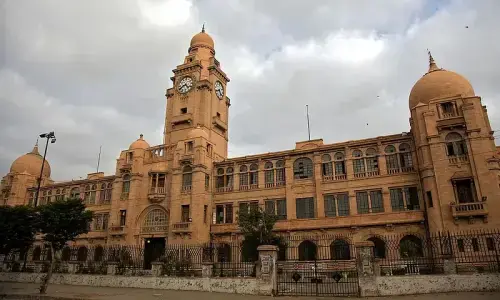KARACHI: Sindh Governor Imran Ismail did not give his assent to the new police law and returned it to the Sindh Assembly for reconsideration, it emerged on Friday.
In exercise of the powers under Article 116(2)(b) of the Constitution, the governor returned the Sindh (Repeal of the Police Act, 1861 and Revival of the Police Order, 2002) Amendment Bill 2019 to the provincial legislature.
Informed sources said that the governor raised objections on the bill and stated that the assembly had passed a bill which did not revive the Police Order, 2002 but was inconsistent with the original law.
Imran Ismail raises objections and returns the bill to the Sindh Assembly for reconsideration
He pointed out that the Police Order, 2002 was a federal law and a judgement of the Supreme Court had established the concurrent jurisdiction of the police order.
“It is a settled principle of law that provincial assemblies can make minor changes in the federal statute to adjust it to the local needs while the bill passed by the Sindh Assembly has deleted 82 sections out of a total 190 sections, which has changed the whole complexion of the Police Order enacted on August 14, 2002, as such it cannot be called the same statute but it is equivalent to enacting a new law,” he said.
“The provincial assembly would be well advised to revisit the bill in view of this observation,” he said in his message to the house.
According to the objections raised by the governor, in contrast to the decision of superior courts, the operational autonomy of police, procedure for posting of the inspector general of police, security of tenure of the IGP, transfer and posting authority in the police department and framing of rules for tenure and postings of police officers are compromised/violated in the bill.
It was also pointed out that the Sindh High Court in its judgement dated Sept 7, 2017 laid down the principle that superintendence of the government should be confined to policymaking domain without any interference in the administration of the police department. Administration of police was decided as exclusive domain of the IGP. But in the bill, it was proposed that the administration and superintendence of police would be with the Sindh government.
Similarly, in the bill the appointment of the IGP is proposed to be decided by the Sindh government from a panel of three officers named by the federal government. “This again is in violation of the original Police Order 2002 and is also against the well-established practice and understanding between the federal and provincial governments where the Establishment Division, Cabinet Secretariat issues the notification for posting of IGP and not the provincial government.”
In the bill, just like the appointment, the removal of IGP was also the prerogative of the Sindh government, undermining the settled judgement of security of tenure of the officer as according to the court judgement that gave the IGP an independent control of transfer and posting without external influence. “The proposed bill has omitted it. The IGP is not empowered to even transfer a DSP.”
According to the bill, the provincial and district public safety commissions and the police complaints commissions are to be appointed and dominated by the government while there should be an equal representation of the opposition as well as prominent independent members from civil society.
“Women are an important segment of our society; the bill has not mentioned anything about it. In fact in every police station there should be a women section headed by a woman officer along with a support women staff,” the governor stated.
Similarly, the section pertaining to complaints of neglect and excesses by the police were deleted with no remedy for the public.
The governor, according to the sources, also pointed out that the civil society representatives, leader of the opposition in the Sindh Assembly and the IGP had formally expressed their serious reservations on the bill and their written submissions dissected the bill at length and pointed out flaws in it. “These reservations carry a lot of weight and should not be ignored,” he said.
The governor said that the rules of procedure and conduct of business in the provincial assembly were also most relevant, while violation of such rules may, in certain circumstances, result in the invalidity of the action.
In this regard, according to the sources, the governor had referred cases — Manzoor Wattoo v Federation of Pakistan PLD 1997 Lahore 38 and action against distribution of development funds by ex-prime minister Raja Pervaiz Ashraf in the matter of PLD 2014.
The governor asked the assembly to reconsider the bill to achieve its true objective of having an independent police force for the province, keeping in view the mandate of Article 143 of the Constitution and guidance of the honourable Supreme Court, which was binding under Article 189 of the Constitution.
Published in Dawn, June 1st, 2019

































